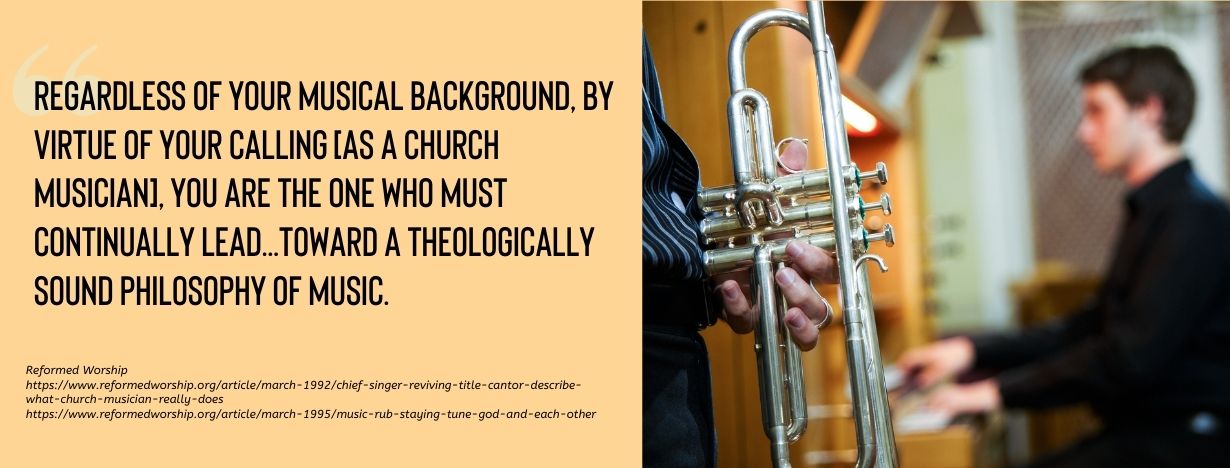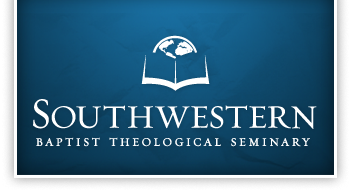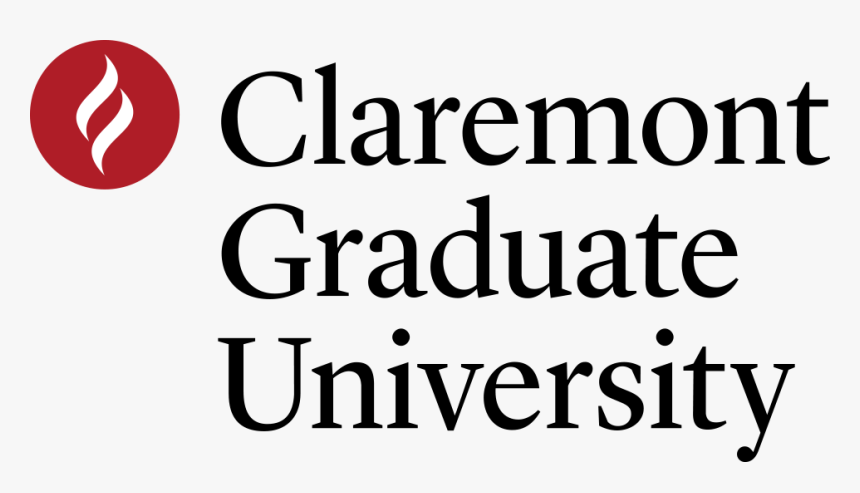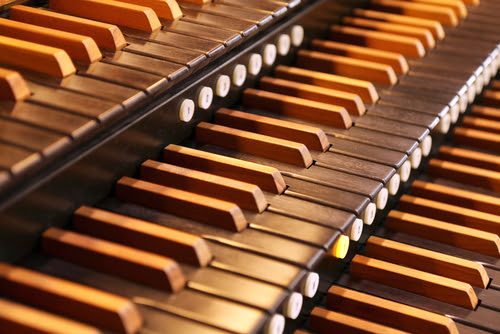By earning a Doctor of Church Music degree, you can be a witness for Christ through your love for music. For believers, Sunday worship is considered a celebration of God and His people. This jubilation would not be possible without church musicians.
Programs for earning a degree, such as Doctor of Church Music (D.C.M.), which plays a key role in such religious gatherings, may not have a significant presence online. However, there are similar programs that adopt a hybrid format.
Some schools allow students to take up some coursework online partially. Other courses will need to be completed on campus to ensure supervision from professors.

A Doctor of Church Music degree program immerses students in the study of music theory, history, and performance. It offers a unique understanding of how music functions in religious congregations and prepares graduate students to become scholars and performers of sacred music.
This degree has an emphasis on applying musical knowledge to the practices of various denominations, as well as opportunities to work with communities to better understand music’s impact.
Depending on the institution, a Doctor of Church Music may also include studies in collaborative music education, spiritual guidance, or pastoral music. Those who complete this program are equipped to lead, manage, and create meaningful church music experiences.
______________________________
Best Doctor of Church Music (D.C.M.) Degree Programs
SOUTHWESTERN BAPTIST THEOLOGICAL SEMINARY

DOCTOR OF MUSICAL ARTS IN CHURCH MUSIC
School Highlights: Southwestern Baptist Theological Seminary is known for combining the highest standards of research and scholarship with vigorous training for real-world ministry.
One of the programs it offers is the Doctor of Musical Arts in Church Music, designed to provide intensive training in one’s major field performance with the intention of advancing musical artistry and scholarly achievement. The study of church music covers both theoretical and historical subjects.
Students can choose among the concentration options with their corresponding core courses. All students earning this degree are expected to minister in the music program of a local church or organization during their term. The Doctor of Musical Arts in Church Music must be completed within a period of seven years from the time of admission.
Concentration Options:
- Guitar Performance and Pedagogy
- Piano Performance and Pedagogy
- Voice Performance and Pedagogy
Campus Location: Fort Worth, Texas
Accreditation:
- Southern Association of Colleges and Schools Commission on Colleges (SACSCOC)
- Association of Theological Schools
Acceptance Rate: 100% Graduation Rate: 82%
LEARN MORE ABOUT SOUTHWESTERN BAPTIST THEOLOGICAL SEMINARY’S DOCTOR OF MUSICAL ARTS IN CHURCH MUSIC.
Did You Know?
As one of the largest seminaries in the world, Southwestern Baptist Theological Seminary is committed to advancing real-world ministry through education.
They offer a Legacy Leadership program, which is designed for graduate and doctoral students who seek to build mentoring relationships with faculty beyond the academic setting.
It aims to help them train for their present and future vocations and be guided in navigating through life’s difficulties.
CLAREMONT GRADUATE UNIVERSITY

DOCTOR OF CHURCH MUSIC
School Highlights: Claremont Graduate University offers a Doctor of Church Music with two concentration options in either Organ Conducting or Choral Conducting. Despite their specialization of choice, the general doctoral curriculum that all students complete includes fascinating course topics ranging from an incredibly wide scope, from modern forms to sacred polyphony.
Consist of 72 units, the program can be completed between 3 to 5 years, depending on full- or part-time course registration, transferred units, and time needed to complete other degree requirements.
Faculty members at Claremont represent some of the world’s preeminent musicians, conductors, and professors of music, all of whom have an enormous amount of experience from across the entire globe.
Graduates are now working in numerous educational, theatrical, and film-based institutions, such as the Lee Strasberg Theater and Film Institute and Berklee College of Music.
Coursework Sample:
- Organ Conducting
- Choral Conducting
Campus Location: Claremont, CA
Accreditation:
- Western Association of Schools and Colleges
LEARN MORE ABOUT CLAREMONT GRADUATE UNIVERSITY’S DOCTOR OF CHURCH MUSIC
Did You Know?
Students earning the Doctor of Church Music degree can get ample performance opportunities through an array of concerts organized by the Music Department at Claremont Graduate University. For those passionate about writing their own music, a chance to present an original composition is presented through the capstone project.
This serves as the culmination of their CGU education. The form is not strictly prescribed, but most works revolve around orchestra or large ensemble. Students can test and establish their musical vision, whether they choose to write and perform a symphony or concerto.
SOUTHERN METHODIST UNIVERSITY

DOCTOR OF PASTORAL MUSIC (DPM)
School Highlights: The Southern Methodist University Perkins School of Theology offers doctoral students a degree in Pastoral Music (DPM). This program is designed for students with a Master of Sacred Music who are experienced musicians steeped in church songs.
Students learn from faculty members at Perkins, as well as those from the Meadows School of Performing Arts at SMU. It is one of the few programs that lets both pastors and musicians interact and learn from each other.
The curriculum includes in-depth coursework in ministerial leadership and vocation, for example, the course entitled, The Person and Role of a Leader in Ministry. The concentration courses dive more deeply into specialized topics in music, such as those listed below.
The elective options allow students to personalize their approach to the DPM, and all students participate in internships in their home and church communities.
Students enjoy the flexibility this program offers through its classes which are often held in an intensive one-week format, allowing them to maintain their positions in congregations and church-related institutions.
Coursework Sample:
- Applied Studies in Church Music
- Music in Worship and Renewal
- Issues in Liturgical Theology and Practice
- Issues in Pastoral Music
- Music and Arts in Missional Ministry
Campus Location: Dallas, TX
Accreditation:
- Commission on Accrediting of the Association of Theological Schools in the United States and Canada
- Southern Association of Colleges and Schools Commission on Colleges (SACSCOC)
Acceptance Rate: 53% Retention Rate: 97% Graduation Rate: 81%
LEARN MORE ABOUT THE SOUTHERN METHODIST UNIVERSITY’S DOCTOR OF PASTORAL MUSIC DEGREE
Did You Know?
The Perkins School of Theology houses the Habito Labyrinth, a famous landmark in the Frost Marcus Labyrinth Courtyard Gardens.
The structure’s seven-circuit design was based on the eleven-circuit medieval labyrinth in France’s Cathédrale Notre-Dame de Chartres. The path of the labyrinth is incredible. It is about one-third of a mile long and can take one 20 minutes to walk at a moderate pace.
UNIVERSITY OF NOTRE DAME

DOCTOR OF MUSICAL ARTS (DMA)
School Highlights: The University of Notre Dame is incredibly well-respected among all American institutions of higher education. The Sacred Music Department supplies a Doctor of Musical Arts (DMA) that includes two concentration options for conductors and organists.
The curriculum as a whole is geared toward ministerial professionals as well as educators. It provides numerous topics in academic leadership and high-level performance.
What sets this DMA program apart from its counterparts is that it qualifies a person to perform music at the highest level, teach performing musicians, and manage performing ensembles.
Students select a personalized combination of courses and practice specialized, complementary skills that are put to use in internships. DMA students intern in their local church or choir while working with highly experienced mentors and field supervisors.
Notre Dame graduates go on to work as Directors of Music Ministry on school campuses and in cathedrals or large parishes. Some hold positions as professors of organs, university organist, professional ensemble conductor, professor of conducting, and many more.
Concentration Options:
- Conductors
- Organists
Campus Location: Notre Dame, IN
Accreditation:
- Higher Learning Commission
- Commission on Accrediting of the Association of Theological Schools
Acceptance Rate: 15% Retention Rate: 98% Graduation Rate: 96%
LEARN MORE ABOUT THE UNIVERSITY OF NOTRE DAME’S DOCTOR OF MUSICAL ARTS (DMA)
Did You Know?
The University of Notre Dame is known for its world-class faculty with impressive qualifications.
While the scholarly faculty studies Gregorian chant, the music of Benjamin Britten, the music of J.S. Back, and even contemporary liturgy, the performance and composition faculty specialize in new music, art song, opera, Baroque organs and technique, and many more.
WORLD MISSION UNIVERSITY

DOCTOR OF CHURCH MUSIC (DCM)
School Highlights: World Mission University is a Christ-centered educational institution that provides a 48-credit Doctor of Church Music (DCM) for post-graduate students.
WMU has spiritual requirements for admission, and all students must be born-again Christians who demonstrate excellence in both attitude and character. Students must also be active in their church communities, as the coursework is designed to enhance their ministerial and professional abilities.
The DCM is a thorough curriculum that includes a graduation recital and comprehensive examinations for graduation. Graduates have well-developed skills in their chosen field of music and demonstrate the ability to lead others with both practical and specialized skills.
For students to successfully earn the degree, they must pass each of the 7 courses and 2 electives with an average grade of B.
Coursework Sample:
- Hymnology
- Understanding the Ministry Environment
- Professional Dissertation Project
Campus Location: Los Angeles, CA
Accreditation:
- Association for Biblical Higher Education
- Commission on Accrediting of the Association of Theological Schools
Acceptance Rate: 100% Retention Rate: 47% Graduation Rate: 100%
LEARN MORE ABOUT WORLD MISSION UNIVERSITY’S DOCTORAL DEGREE IN CHURCH MUSIC (DCM)
Did You Know?
World Mission University holds the distinction of being recognized by the World Evangelical Mission Alliance (WEMA) as a major source for training prospective missionaries, ministers, professionals, and church leaders.
The university’s flagship is the School of Theology, designed to carry out its mission to prepare dedicated students to exercise Christian leadership through its relevant degree programs, including Doctor of Church Music, Master of Arts in Worship, and Doctor of Ministry, among others.
Frequently Asked Questions
What does a Church Musician do?
A church musician plays music in a Christian assembly or a place of worship to promote spiritual expression along with the congregation. With the use of various instruments, such as the organ and piano, the church musician is able to lead the choir and draw people closer to prayer. This musical aptitude flows on a heavy rhythm or tune that compels participation from attendees.
Most church musicians perform in Christian churches and denominations. Sometimes, they play in concerts and novelty platforms to promote the Christian faith to the greater public.
They also initiate fundraising activities for the community or run charities through musical engagements like live performances and Christmas carols. Lastly, they compose original music and sell records from classical to Gospel song genres.
What sort of accreditation should I look for in a school for a Church Music degree?
Due to the number of Christian sects and denominations, no single authority holds the accreditation for D.C.M. programs.
However, there are some credible accrediting bodies to look for. In general, the Association of Theological Schools (ATS), along with the Commission on Accrediting, provides guidelines for quality education for all Christian programs (including D.C.M.) in the United States and Canada.
The National Association of Schools of Music (NASM) also accredits institutions teaching music both in the secular and religious realms.
Since religion is a global entity, international accrediting associations like the Theological Accreditation International (TAI) and the International Senate of Theological Accreditation (ISTA) assess D.C.M. programs as independent non-profit organizations.
How do I earn my D.C.M. degree?
If you have decided to pursue a D.C.M. degree, you need to have a master’s diploma in music first. Some schools accept applicants with a Master of Divinity degree.
Be careful in choosing the right graduate school for you because some institutions require a specific religious affiliation before admission. Some can have pretty stringent rules when it comes to “spiritual requirements.”
D.C.M. students are trained to be professional performers, conductors, and composers. The program usually lasts three to four years, inclusive of coursework and a capstone project.
The D.C.M. coursework involves training in various musical instruments, particularly the church organ. Professors lecture them with the survey of the liturgical music of the past to the present. They are also exposed to the historical backgrounds and contexts that inspire church musicians of certain ages to compose their songs of worship.
The capstone project is usually an opportunity to present original compositions in an orchestra or any instrumental band of their choice. With this program design, D.C.M. graduates take pride in being educated both in the professional and ecclesiastical sense.
What type of degree do I need to pursue research or educate others in Church Music?
Typically, a doctorate-level degree in music would qualify a musician or artist to teach in a D.C.M. school. These degrees vary from D.C.M., Doctor of Musical Arts (DMA), Doctor of Sacred Music (DSM), and various Ph.D. degrees in Music, Musicology, or Music Theory.
Quite a number of musician-scientists who specialize in church music continue to publish scholarly articles in many academic journals highlighting the historical, social, and cultural relevance of religious music.
Church musicians educate the community in their unique way simply by producing songs and performing them in concerts, records, and Sunday services.
How do I earn a transitional or bridge D.C.M. degree?
So far, no graduate program offers an entirely online format for graduate students. However, some institutions provide a hybrid educational format wherein you can take half of the subjects online while the other half is on campus.
Check their program thoroughly. It might not be the exact “D.C.M.” degree, but it can be a similar doctorate-level degree in sacred music.
What kind of career and salary can I expect with my D.C.M. degree?
Earning a D.C.M. will allow you to take on musical direction roles and earn about $25.12 per hour. According to the Bureau of Labor Statistics (BLS), music directors in the US earn an annual median salary of at least $62,940.
Music professors in universities get a stable pay of $75,940 per year.
For those D.C.M. degree holders directly serving in a church setting, earnings depend on the size and tithe revenue from the congregations. It could be dishearteningly low or ridiculously high, depending on the venue’s population, location, and church attendance.
Do I need a license to be a Church Musician?
No, you don’t need a license to perform songs of worship. However, there are some companies that regulate Christian worship songs, such as Christian Copyright Licensing International (CCLI). If you are playing a song outside of the public domain list, you might need to pay for a CCLI license.
What schools offer Doctor of Church Music degrees?
Most institutions that offer a D.C.M. degree are contracted in California. Leading this list is Claremont Graduate University in Claremont, CA whose program has two concentrations: Organ and Choral Music.
Two institutions located in Los Angeles, CA are affiliated directly with religious organizations. The World Mission University only accepts Born Again Christians with a deep spiritual background.
The SMU Perkins School of Theology is an excellent school for students of faith and includes strong coursework in vocation and leadership. Both universities have theology subjects heavily loaded on their curriculum.
The University of Notre Dame’s Sacred Music Department provides a Doctor of Musical Arts (DMA) that is perfectly suited to both Choir Conductors and Organ Conductors and supplies all of the requirements for future work in ministry.
Music cannot be divorced from any religious activity. Aside from ministers, church musicians also play an essential role in propagating the faith. With the right education in both music and theology, it is said that one’s Christian life will always be “properly tuned.”
What qualities will make me a good Church Muscian?
- Reliability- Church musicians must be reliable and dependable. Being late to rehearsals, worship services, and events, or canceling altogether without good reason, is not acceptable.
- Adaptability- Church musicians must be able to quickly and comfortably shift gears and lead music in different styles and genres for different services and occasions.
- Creativity- Church musicians must be able to think outside of the box and come up with creative solutions to difficult musical challenges.
- Leadership- Church musicians must be good leaders, able to organize, direct, and motivate other musicians and their choirs.
- Attention to detail- Church musicians must have exceptional listening skills and an eye for detail in order to ensure that all parts are well blended and balanced together.
- Self-directed- Church musicians must be able to be self-directed and take the initiative to learn the music needed for services without needing to be told or asked to do so.
- Compassion- Church musicians must be compassionate and able to provide support and affirmation to members of the choir and congregation.
- Organizational Skills- Finally, Church musicians must be organized and have excellent time management skills. Being able to keep track of rehearsal schedules, deadlines, and commitments is vital.
Additional Information:
